
Nasser Hussain was one of the most significant captains in the history of the England team. When he was a Wisden Cricketer of the Year in 2003, Scyld Berry wrote this revealing portrait.
Nasser Hussain has always been too intense to inspire mass affection. Like Nick Faldo, or Steve Redgrave, or other English sportsmen suspected of being obsessive, he has inspired respect instead. In his four years as England’s captain, Hussain should have inspired gratitude too. Last winter, in the first three Ashes Tests, England were a rowing-boat overwhelmed by the mountainous waves of Australian cricket. Almost every touring side had capsized against Steve Waugh’s team in Australia; but Hussain, a beleaguered skipper if ever there was, kept England afloat.
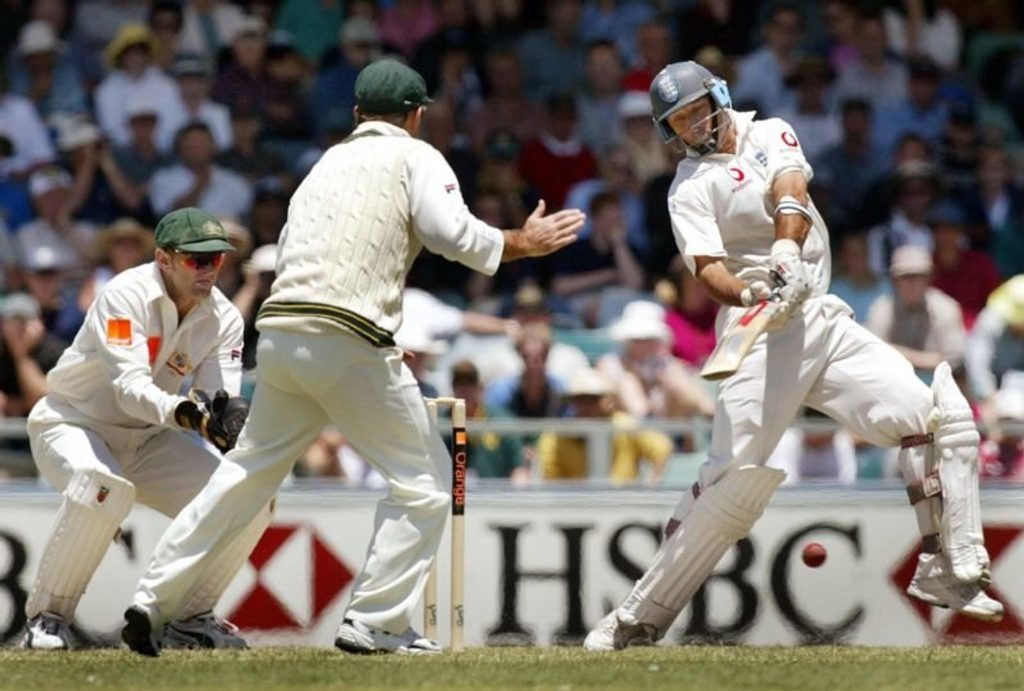 Hussain cuts during the 2002/03 Ashes
Hussain cuts during the 2002/03 Ashes
If one image could sum up the tour, it came in the one-day matches before Christmas when England – 3–0 down in the Test series – had to play four one-day internationals in eight days at venues as widespread as Melbourne, Brisbane and Perth. Any other England captain might have let his exhaustion, physical or mental, show. But there was Hussain in the field, hectoring, urging, berating, then exploding in celebration at the fall of each wicket. England have not had such an ardent captain since Douglas Jardine, another cricketer whose obsessiveness was not to English taste. Spurred on by this zeal, and blessed when injuries at last struck Australia instead, England won the Fifth Test in Sydney.
It has not been zeal alone which has fuelled the England team since 1999, but a sharp intellect blended with a diplomat’s skill. Hussain has helped to educate the cricket public, and media, as Mark Taylor did in Australia a few years earlier. With his honest insights into the state of English cricket (and occasional propaganda), Hussain has raised the level of debate above the platitudes which used to prevail.
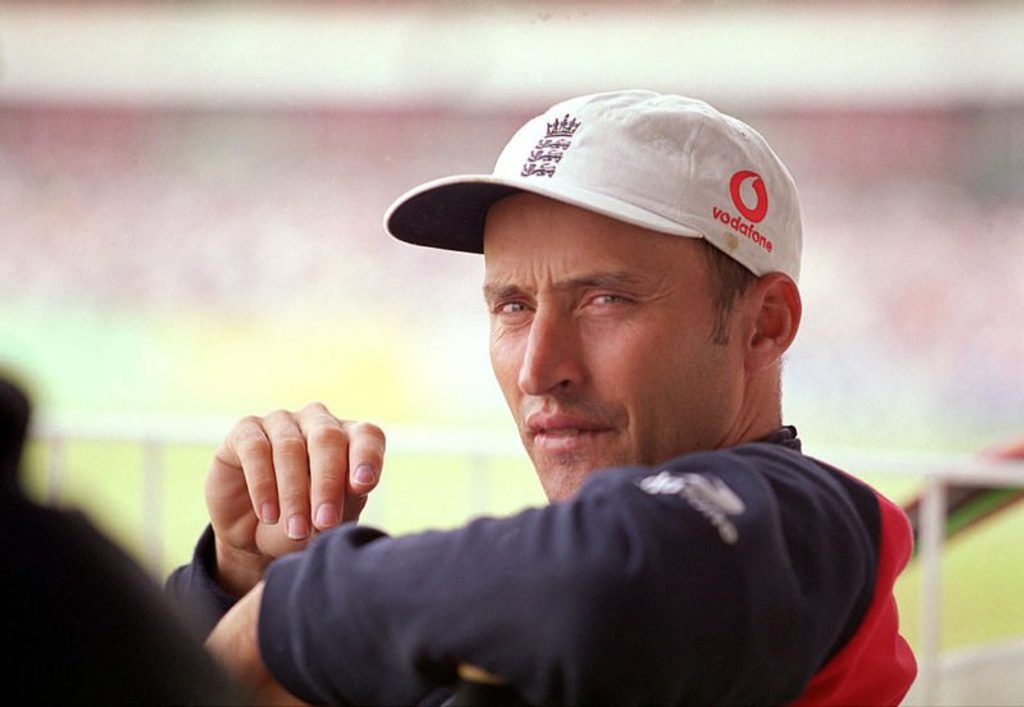 “Sharp intellect blended with a diplomat’s skill”
“Sharp intellect blended with a diplomat’s skill”
Using a mind that won a Maths scholarship to Forest School and achieved a 2.2 in Geology and Chemistry at Durham University when cricket allowed, Hussain also advanced the moral argument for England not to play in Zimbabwe: it was believed to be the first time in England that team sportsmen at national level, and certainly the whole cricket team, had exercised their consciences. Above all, Hussain’s legacy is that he has raised standards inside and outside the England team.
NASSER HUSSAIN was born on March 28, 1968 in Madras (now Chennai). His father Javaid, or Joe, represented Madras in the Ranji Trophy before emigrating to England, where he married an Englishwoman, Shireen. He then returned to India to set up an electronic-components factory in Madras, where the youngest of his three sons was born.
Nasser’s first experiences of cricket were family visits to Chepauk, where his father was a member of the Madras Cricket Club. His elder brothers Mel and Abbas used to bat on the outfield while he chased after the ball. When Joe returned with his family to England, and took charge of the indoor cricket school in Ilford, Nasser used to bowl for hours on end at his elder brothers, and not just because he was the youngest: he found leg-spin interesting. He was keener on football at first – supporting Leeds United, as he still does, and playing for school teams – but Sunday mornings were always dedicated to cricket, and his father kept pushing him in this direction. At eight, he was bowling leg-breaks for Essex Schools Under-11s, and at 12 for their Under-15s.
Born five days apart, Hussain and Mike Atherton soon found their careers progressing in parallel as they captained, batted and bowled leg-spin for England age-group teams, while also passing enough exams to go to a leading university. In his mid-teens, however, Hussain “grew a foot in a winter” and the trajectory of his bowling was altered: “I went from bowling out Graham Gooch in the indoor school with everyone watching to hitting the roof or bowling triple-bouncers in deadly silence.”
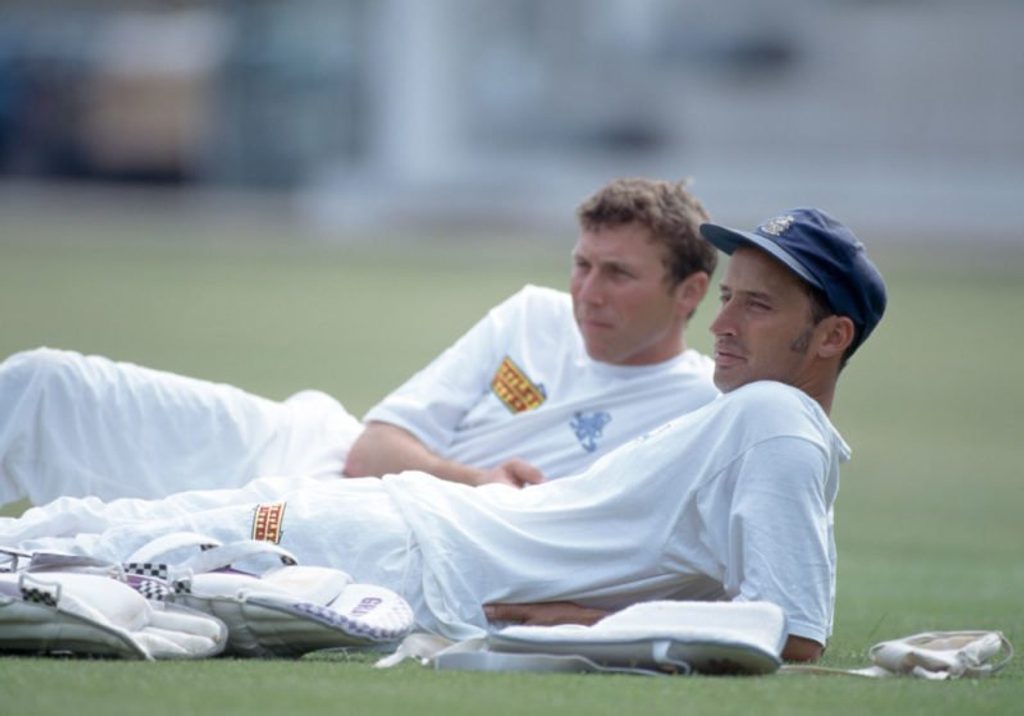 Atherton and Hussain followed similar trajectories
Atherton and Hussain followed similar trajectories
His father remembers him crying in bed at the loss of his leg-break; the son felt he was letting his father down. He was also anxious not to be left behind by his peers, boys like Atherton, Trevor Ward, Martin Bicknell and Chris Lewis. So he made himself into a batsman, moving up the order from tail-end to opening or No. 3, and becoming the first boy at Forest to score 1000 runs in a season since 1901. Vestiges of this manufacturing process remain in his technique: he bats with little left elbow and plenty of bottom hand, and backs up with the bat in his right hand (not that Duncan Fletcher minds). In general, his runs seem to be scored as much by an exceptional effort of will as through natural talent. These characteristics have been most apparent in one-day cricket, or when Michael Vaughan at the other end has been stroking the ball around with classical orthodoxy.
He also developed a reputation. The fieriest of three brothers who had all inherited their father’s short temper, he vented his frustration at being dismissed – and at being unable to bowl leg-spin? – on his equipment or anything else in sight. He came to be bracketed with Graham Thorpe and Mark Ramprakash as a brat-pack. By the time he became captain, Hussain was as unpopular as any cricketer in England. The perception, though, was worse than the reality. Self-obsessed as he may have been, driven to succeed as many migrants are, and seldom the one to depart after a run-out, he confined his tantrums to the dressing-room (including altercations with his Essex team-mates Neil Foster and Mark Ilott). He describes himself as “a fairly shy sort of bloke”. According to his father, he inherited “good sense” from his mother, together with a sturdy sense of right and wrong.
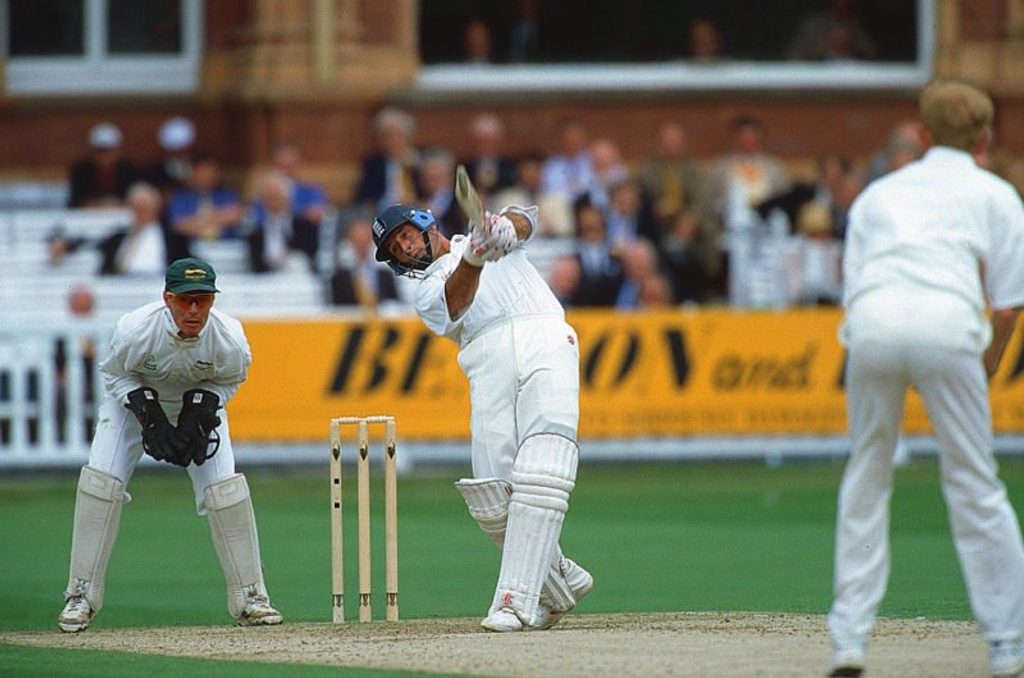 Hussain at the crease for Essex in the Benson and Hedges Cup final of 1998
Hussain at the crease for Essex in the Benson and Hedges Cup final of 1998
The frustrations built up through his early twenties. Taken under the wing of Gooch, his Essex and England captain, who urged him to play straighter and less behind point with an open face, Hussain made his Test debut on the 1989-90 tour of the West Indies but was mostly out of the side thereafter. His Essex record was good without being outstanding. He spent the 1994-95 winter playing in South Africa, where he was prescribed a contact lens (he has since had laser treatment on his left eye).
The England A-team captaincy in Pakistan the following winter was a lifeline: it took him out of himself, encouraged him to think he might be fulfilled, and proved that he was not as bad or moody as his reputation suggested. When he was recalled to the Test team at the start of the 1996 season in the problem position of No. 3, he survived a big appeal off Javagal Srinath, and went on to his maiden Test hundred. A year later, he made 207 as England for once went ahead in a modern Ashes series. Only injury has kept him out of the team since.
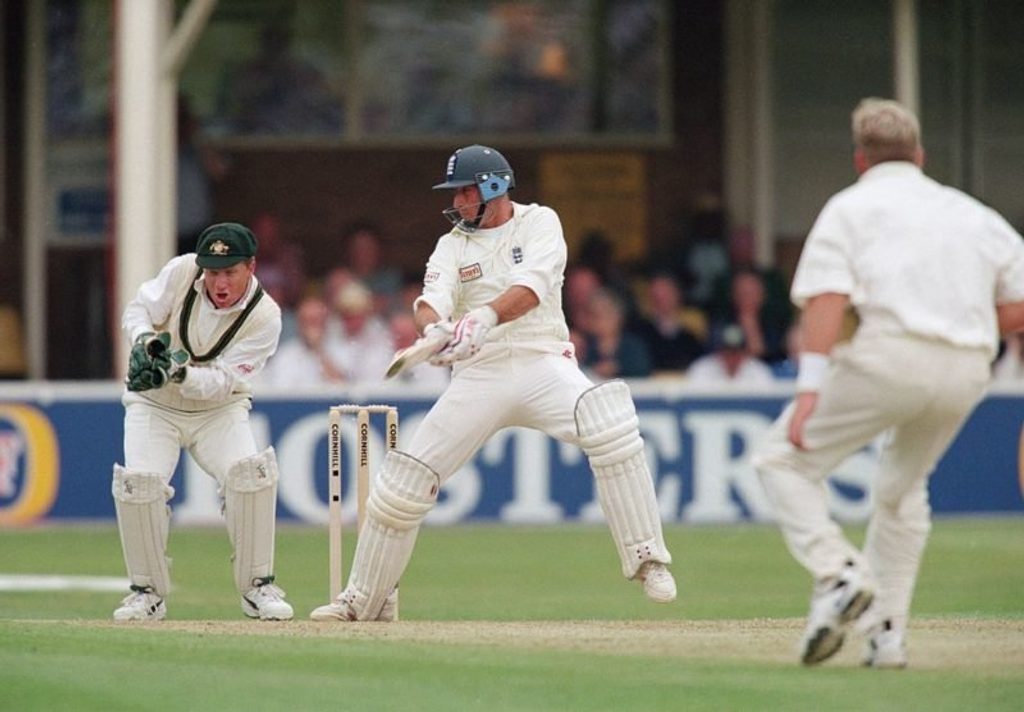 Hussain’s 207 against Australia was his highest Test score
Hussain’s 207 against Australia was his highest Test score
When Atherton resigned as England captain in 1998, Hussain had to wait while Alec Stewart had his turn. But when Stewart was sacked after the 1999 World Cup, he was matured and ready for the responsibility. His first Test in charge ended in victory as England dismantled a modest New Zealand side; his first series in failure when Hussain broke a finger in the Second Test and England fell apart. But help was on its way with Duncan Fletcher joining as coach for that winter’s tour of South Africa. They had not met before but it was a fine partnership from the first. Hussain generated heat, Fletcher light.
Fletcher planned and prepared the players – identifying those with the right character and refining their technique, especially when batting against spin – while Hussain led them zealously on the field. Once a new system of squad players contracted to the ECB was put in place, English cricket was set for its finest achievements – four successive Test series won – since the Ian Botham era ended in the mid-1980s.
But for Hussain himself, 2000 was also an annus horribilis. He did not make a first-class fifty until his final match, the Karachi Test. His place in the side was never questioned as his players and the media appreciated his captaincy, but he still couldn’t make a run. Looking back, Hussain can see that he gave too little attention to his own game, that he took his own form for granted after a hugely productive tour of South Africa. It didn’t matter if he didn’t make runs against Zimbabwe, while against West Indies he became consumed by the prospect of England beating them in a series for the first time since 1969.
By the Oval Test, completely out of form, he went out to bat in the second innings unaware that he was on a pair, and duly bagged one. Once he learned to compartmentalise, he worked out that 60% of his attention had to go on the team, 40% on his own game. And the effect on his own game may be judged by the fact that he has been England’s one consistent batsman in their last five Test series. Every time, his first innings of the series has yielded at least a half-century: the captain stamping his mark.
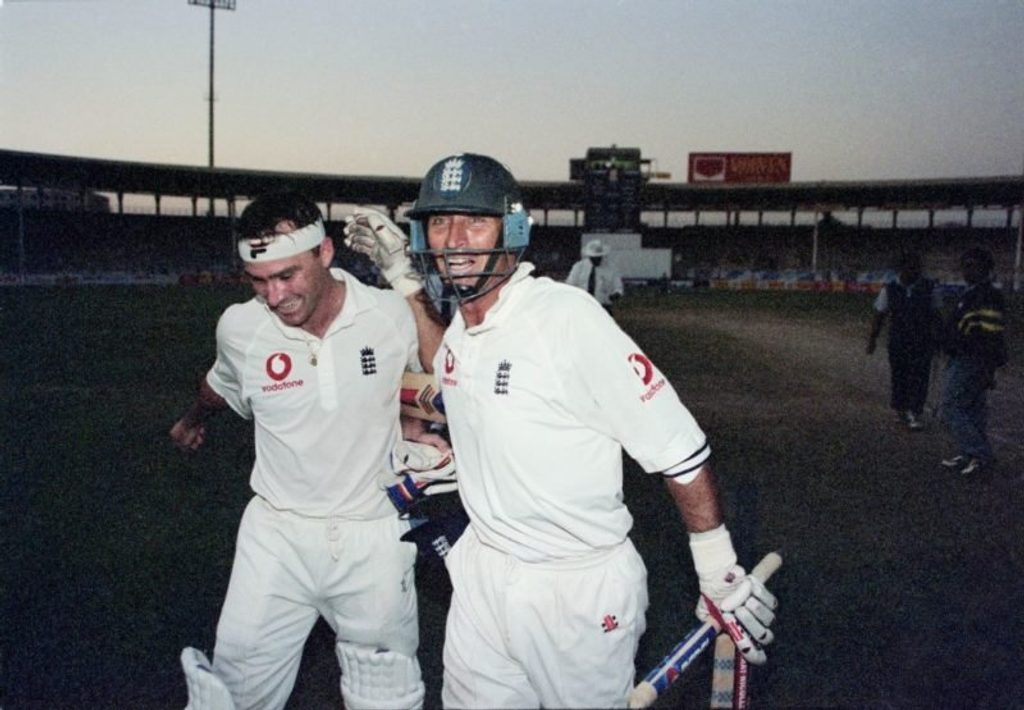 Hussain and Thorpe celebrate victory in Karachi
Hussain and Thorpe celebrate victory in Karachi
England’s series victories in 2000-01, by 1-0 in Pakistan and 2-1 in Sri Lanka, were the apogee of Hussain’s captaincy – and of a generation of England cricketers, including Atherton, Stewart, Thorpe, Darren Gough and Andy Caddick. In Pakistan, England held on doggedly until the pressure told on the home team, who had never lost at Karachi before. In Sri Lanka, England overcame the stifling heat and the stifling spin of Muttiah Muralitharan. If one session marked the climax, it was when England dismissed Sri Lanka in the Third Test in Colombo in only 28.1 overs. Hussain went into the match injured and could barely walk by the end of it, but his zeal – his passion – won the day.
The hope was that England could go on to win the Ashes series of 2001. Instead, they went from apogee to nadir with a 4-1 defeat. England began a run of injuries which lasted into the following Ashes series and raised numerous questions about their medical team. Hussain himself broke a finger in the First Test against Australia at Edgbaston and missed the next two. If any good came of it, it was the plastic coating which he adopted as extra protection on his gloves. Since then, he has not missed a Test.
A mark of his captaincy has been his refusal to accept mediocrity, however often his batsmen have failed to follow his example and given their wickets away, however inaccurate his seamers have been, however little his spinners have turned the ball. Atherton in the end became resigned to his bowlers’ and fielders’ fallibility; Hussain has barked at every foible and thought up new ways to dismiss batsmen. His imaginative use of 8-1 fields paid off in India when the home batsmen, after their First Test win, were content to be tied down; and again at times last summer when Sri Lanka were beaten 2-0, the one win to set against three recent losses and three drawn series; but in Australia the batsmen refused to be tied down and it was widely reckoned that Hussain asked his bowlers to experiment too much.
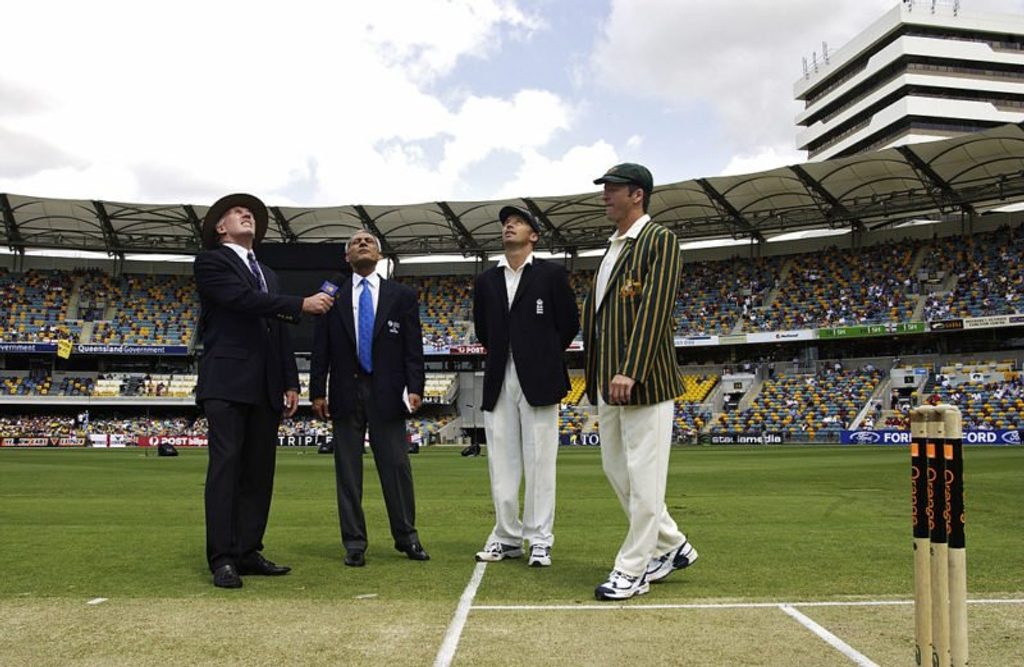 Hussain infamously opted to bowl at the Gabba during the 02/03 Ashes
Hussain infamously opted to bowl at the Gabba during the 02/03 Ashes
He thought his seamers had matured to the extent that he could send Australia in at Brisbane and give his bowlers best use of the pitch; he admitted his mistake long before the match ended in massive defeat. By the Third Test in Perth he was considering his position, not for the first or last time, but in the darkest hour he pushed himself as hard as ever. While England were lucky that Glenn McGrath and Shane Warne were both injured, they still had to be in good enough shape to take advantage. After the Sydney Test, Hussain received “a really nice e-mail” from Gough, which meant a lot as an expression of esteem from his peers.
After the World Cup he retired as England’s one-day captain, sensibly deciding to concentrate on Test cricket. By then his wish to be remembered as “a decent leader of men” had already been fulfilled. The only dispute is whether he has been the equal of Mike Brearley as the best England captain since World Series Cricket; or, as their fellow-captain David Gower believes, even better, in more troubled times. To have been captain of England for four years, the most stressful job in cricket, is an achievement in itself. To leave the team better off than when he started, doubly so.








